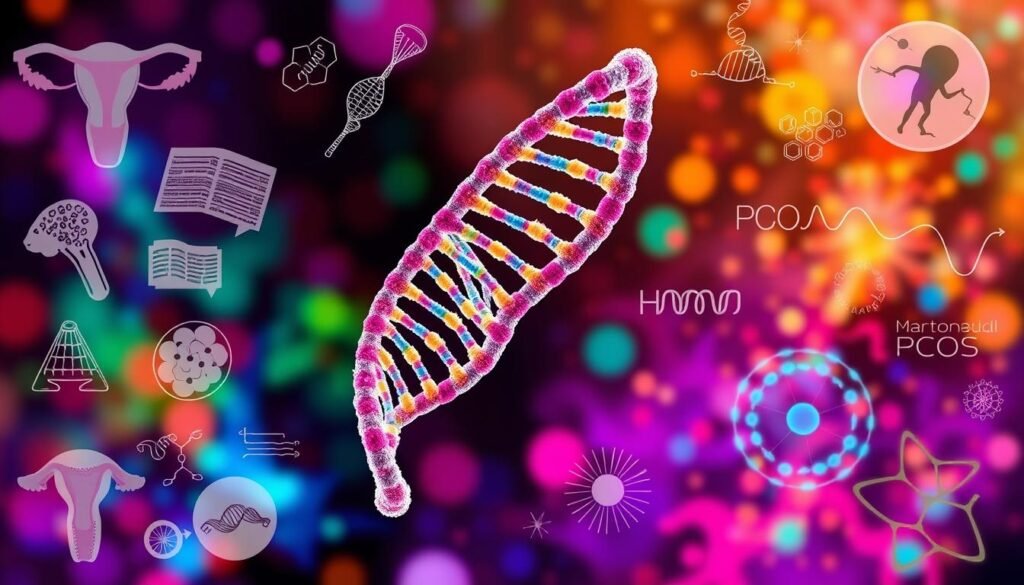About 1 in 10 women of reproductive age have Polycystic Ovary Syndrome (PCOS). This fact shows how common PCOS is. It affects reproductive health and is linked to hormonal imbalances and genetics. Studies show genetics play a key role in PCOS, highlighting the importance of family history in this disorder.
Research into PCOS genetics is revealing more about this condition. Acknowledging genetic factors helps improve treatment and management. We will explore how genetics and PCOS are connected and impact individuals.
Key Takeaways
- PCOS affects about 1 in 10 women, making it a common concern.
- Genetic factors significantly influence the likelihood of developing PCOS.
- Understanding genetic markers can improve treatment strategies.
- Hormonal imbalances are a key feature of PCOS.
- Recent studies focus on hereditary connections to PCOS.
Introduction to PCOS and Its Impact
Polycystic Ovary Syndrome (PCOS) is a common endocrine disorder. It affects many women who are of reproductive age. An introduction to PCOS shows it’s known for symptoms like irregular periods, acne, and weight gain. These issues deeply affect women’s health.
The PCOS impact goes beyond just physical problems. It also hits emotional well-being and how women interact with others. Those with PCOS might feel frustrated and anxious. This is because the disorder is hard to predict. Plus, how society sees this condition can make women feel alone or bad about themselves.
Getting the right healthcare and support is key in handling PCOS. The right diagnosis and treatment can really help improve life for those dealing with it. As understanding of PCOS grows, the hope is for more and better support. This would be support that meets the unique needs of each person.
The Role of Genetics in PCOS
Genetics plays a key role in Polycystic Ovary Syndrome (PCOS). Researchers are looking deeply into this area. They find that genes have a big impact on this disorder. This means PCOS can be inherited, passing from parents to children.
Knowing the genetic side of PCOS helps in managing it better. It can lead to treatments that are more personalized. Also, genes and lifestyle together affect PCOS symptoms. The environment also plays a role, showing we must look at various factors in treatment.
Understanding Genetic Factors in PCOS Development
Genetics and hormones work together in causing polycystic ovary syndrome (PCOS). Certain genetic factors in PCOS can make people more prone to hormone problems. This includes higher androgen levels and trouble with insulin. Knowing how genetics and hormones interact helps in treating PCOS better.
Connection Between Genes and Hormonal Imbalances
Research shows that some genes affect how hormones are made. Those with a genetic predisposition might face issues like gaining weight, having irregular periods, and getting acne. Gene differences that affect insulin can lead to insulin resistance, a key problem in PCOS.
Influence of Family History
Having family history in PCOS raises the chances of developing this syndrome. If family members have PCOS, you’re more likely to get it too. Studies have found that those with relatives who have PCOS are more at risk. This shows why genetic counseling is crucial for at-risk individuals.
| Factors | Impact on PCOS |
|---|---|
| Hormonal Imbalances | Lead to symptoms such as irregular cycles and weight issues |
| Genetic Predisposition | Increases risk for developing metabolic issues |
| Family History | Informs likelihood of PCOS development |
Common Genetic Markers Associated with PCOS
Research into genetic markers of PCOS is shedding light on this condition. By pinpointing specific genes, scientists better understand PCOS. This research opens doors to potential new treatments.
Identifying Specific Genes
Studies have found genes linked to PCOS, showing a connection to the disorder. Learning about these genes helps us grasp the hormonal and metabolic issues in PCOS.
Research Studies on Genetic Variants
Looking into genetic variants has been key in understanding PCOS’s genetics. Numerous studies have found links between SNPs and PCOS. This work is crucial for grasping how genetic differences impact PCOS and its symptoms.
| Study | Specific Genes Identified | Key Findings |
|---|---|---|
| Study 1 | ANDR, FSHR | Associated with hyperandrogenism in PCOS patients. |
| Study 2 | INSR, SHBG | Linked to insulin resistance commonly observed in PCOS. |
| Study 3 | LH, CYP19A1 | Influences ovarian function and hormonal balance. |
Heredity and Its Influence on PCOS
Heredity plays a key role in PCOS by affecting its genetic aspects. It shows patterns like autosomal dominant and multifactorial traits. Understanding these can help diagnose and treat PCOS in families better.
Patterns of Inheritance
Studying patterns of inheritance helps understand how PCOS passes through generations. We know of several types:
- Autosomal Dominant: Here, a single mutated gene from one parent can cause PCOS in children.
- Multifactorial Inheritance: This involves many genes and environmental factors increasing the risk of PCOS.
Family Studies and Their Findings
Family studies have given us insights into PCOS’s familial aspect. They show PCOS is more common in relatives of affected people. The findings include:
| Relation to Affected Individual | Increased Risk of PCOS |
|---|---|
| Mother | 50% higher chance |
| Sisters | 30% higher chance |
| Daughters | 40% higher chance |
DNA Analysis in PCOS Research
Advanced DNA analysis techniques have greatly improved our grasp of polycystic ovary syndrome (PCOS). DNA research recently exposed key genetic elements tied to this complex condition. With the latest PCOS DNA testing methods, researchers can accurately pinpoint genetic risks. This leads to customized treatment plans.
How DNA Testing Works
For DNA testing, scientists take genetic material from saliva or blood. They then analyze this DNA to find markers that indicate PCOS. Technologies like whole genome sequencing help spot specific mutations. This deepens our understanding of diseases like PCOS.
These studies reveal how different genetic factors play a part in PCOS. They bring new insights constantly, improving how we see this syndrome.
Current Advancements in Genomic Studies
Latest genomic studies have uncovered the importance of genetic variations, such as the FTO gene. This variation links to metabolic issues seen in PCOS. Learning about these markers helps enhance diagnosis and treatment. For detailed info, check the study here.
The growth in DNA analysis underscores its importance in decoding PCOS genetics. By understanding these genes, we can approach PCOS in new ways.

Implications of Gene Expression in PCOS
Gene expression in polycystic ovary syndrome (PCOS) shows a complex mix of genetics and environment. How genes are regulated is key in PCOS traits. This affects hormone balance and how the body uses energy. Knowing this helps find new treatments.
Understanding Gene Regulation
Regulating PCOS genes is essential for managing the condition. Changes in these genes can lead to issues like excessive male hormones and ovary problems. For instance, variations in CYP11a and CYP17 genes change hormone levels, affecting fertility. Learning about these changes can improve research and treatment.
How Environmental Factors Interact with Genes
Environment plays a big part in the genes of those with PCOS. Diet, exercise, and chemicals can change PCOS symptoms. Healthy habits might help manage these symptoms. This link shows how treatments can be personalized, mixing lifestyle and genetics. This approach may lead to better ways to handle PCOS.
| Factor | Impact on Gene Expression |
|---|---|
| Diet | Can enhance or reduce the expression of PCOS-related genes. |
| Exercise | Improves gene regulation, providing hormonal balance. |
| Endocrine Disruptors | May negatively affect gene expression, worsening symptoms. |
| Stress | Can impact hormonal balance, influencing gene regulation. |
Genetic Disorders and Their Association with PCOS
Understanding how genetic disorders relate to polycystic ovary syndrome (PCOS) shows the complexity of this health issue. Various genetic disorders linked to PCOS impact its diagnosis, treatment, and our understanding of where it comes from.
Common Genetic Disorders Linked to PCOS
Turner syndrome and congenital adrenal hyperplasia are disorders that might occur with PCOS. They can make PCOS symptoms more complex and harder to diagnose. Doctors often use genetic tests to better understand these links and create effective treatments.
Symptoms and Diagnosis
Recognizing symptoms of genetic disorders related to PCOS is key for a right diagnosis. These symptoms can include hormonal imbalance, uneven menstrual cycles, and metabolic issues. Diagnosing PCOS usually involves looking at reproductive and genetic health together.
A detailed check-up helps tell apart PCOS symptoms from those caused by genetic problems. This leads to more personalized treatments linked to genetic factors.

Genetic Counseling for PCOS Patients
Genetic counseling is crucial for people with PCOS. It helps them understand their genetic risks. This knowledge lets patients make smart choices about their health and family planning.
The value of this counseling is huge. It gives the necessary advice to manage genetic risks well.
Importance of Genetic Counseling
PCOS genetic counseling clears up how genetics affect the condition. It is useful for many reasons:
- Assessing family history and potential genetic links.
- Understanding the implications of genetic testing.
- Receiving tailored information regarding management and treatment options.
- Connecting with support resources for emotional well-being.
This shows why counseling is key to taking charge of health.
What to Expect During Counseling Sessions
In counseling sessions, a comforting talk awaits patients. A skilled genetic counselor will lead the conversation about:
- Individual and family medical history.
- Potential genetic tests available for diagnosing PCOS.
- Results interpretation and implications for health.
- Emotional support and resources for dealing with the condition.
By going to these sessions, patients learn a lot about their health and genetics. They also find support and comfort in their journey.
Advancements in Genetic Testing for PCOS
In recent years, we’ve seen huge strides in genetic testing for PCOS. These discoveries shed light on the condition’s genetic roots. They pave the way for treatments that meet the needs of each person affected.
Benefits of Genetic Testing
Genetic tests for PCOS bring many benefits. They can lead to finding the condition early and tailoring treatment plans. This testing pinpoints genetics that may increase risk. It gives healthcare providers a powerful tool for care. Knowing these genetics helps in creating precise solutions for each individual.
- Early identification of PCOS risk factors.
- Customization of lifestyle changes to mitigate symptoms.
- Precision medicine that tailors pharmaceutical treatments.
- Enhanced understanding of familial patterns in PCOS.
How Testing Can Inform Treatment Plans
Genetic tests lay the groundwork for unique treatment plans. Medical experts can use genetic info to recommend specific therapies and lifestyle tips. This approach boosts health and gives patients useful info about their condition.
| Type of Insight | Example of Actionable Treatment |
|---|---|
| Hormonal imbalances | Medication to regulate insulin levels |
| Genetic predisposition for obesity | Personalized nutrition and exercise plans |
| Family history considerations | Screening for associated conditions |

Personalized Medicine and PCOS Treatment
Personalized medicine is changing healthcare, especially for PCOS. Doctors use your genetic info to make a custom PCOS treatment. This method targets your specific symptoms and problems. It’s a more effective way to manage PCOS, leaving behind general treatments.
Tailoring Treatment Based on Genetic Information
Treatment based on genetic information offers better care for PCOS. Doctors check your genes to find the right medicine and lifestyle changes. This method helps ease symptoms better and can lessen side effects from usual treatments.
Future Directions in Personalized Healthcare
The future of healthcare is moving towards personalized medicine. More research into genetics means treatments will get more personal. Look forward to easier genetic tests and a focus on stopping problems before they start. This change could make life better for those with PCOS, showing how custom healthcare is the way forward.
Conclusion
Studying genes in PCOS shows us how nature and our surroundings work together. This look into genetics shines a light on the complex relationship between PCOS and our genes. It also shows why we need to combine knowledge from different fields to care for patients.
Research keeps showing us new things. It’s crucial to keep digging to see how different factors raise the risk of getting sick.
Learning about PCOS genes helps a lot with treatment. As gene tests get better, doctors and scientists can create more personal treatments. Genetic advice is very important, too. It helps patients understand their situation better, leading to better health.
We must keep researching to unwrap the ties between society, behavior, and genes in PCOS. Such strategies improve not just one person’s health but also tackle wider health gaps. For those digging into the research’s ethical side, the National Institutes of Health offers more insights. A broad approach is key for future breakthroughs in PCOS treatment, promising a healthier future for many.